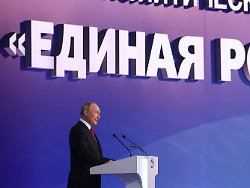Wednesday, August 25, 2021
“Direct threat” to Russia
Putin reckons with the West’s Afghan legacy
The Kremlin has never had any praise for the NATO-led Afghanistan mission. But the chaotic withdrawal of Western troops is making the situation even worse, according to the Russian President. Putin fears the spread of terror and destabilization of the region.
Russian President Vladimir Putin has accused the West of wreaking havoc in Afghanistan and creating a major terror threat to other countries. “There is a risk that terrorists and various groups who have found refuge in Afghanistan will take advantage of the chaos left by our Western partners,” Putin said in Moscow. Terrorists could escalate the situation in neighboring countries.
“This is a direct threat to our allies and to our country,” said Putin, referring to the ex-Soviet republics of Tajikistan and Uzbekistan, Afghanistan’s direct neighbors. There is a risk that drug smuggling and illegal migration will increase, he said at an event organized by the Kremlin party, United Russia, ahead of the parliamentary elections on September 19. “These are all threats to us. They are absolutely real.” Putin recently warned several times that terrorists from Afghanistan could seek refuge abroad under the guise of political asylum.
At the same time, Putin stressed that Russia would not allow itself to be drawn into the conflict again. “The Soviet Union had its experience of staying in this country. We drew the necessary conclusions from it.” Moscow led an internationally criticized military intervention in Afghanistan from 1979 to 1989. Thousands of Soviet soldiers died.
Russia’s Defense Minister Sergei Shoigu criticized the fact that the militant Islamist Taliban now had control of a “large number of weapons” from NATO troops after they came to power. He also expressed concern about drug smuggling. “93 percent of the heroin in the world is Afghan,” he said. That is a danger. Russia hoped that the US and its allies would get the problem under control. “But the plantations have increased a hundredfold,” said Schoigu.
.
